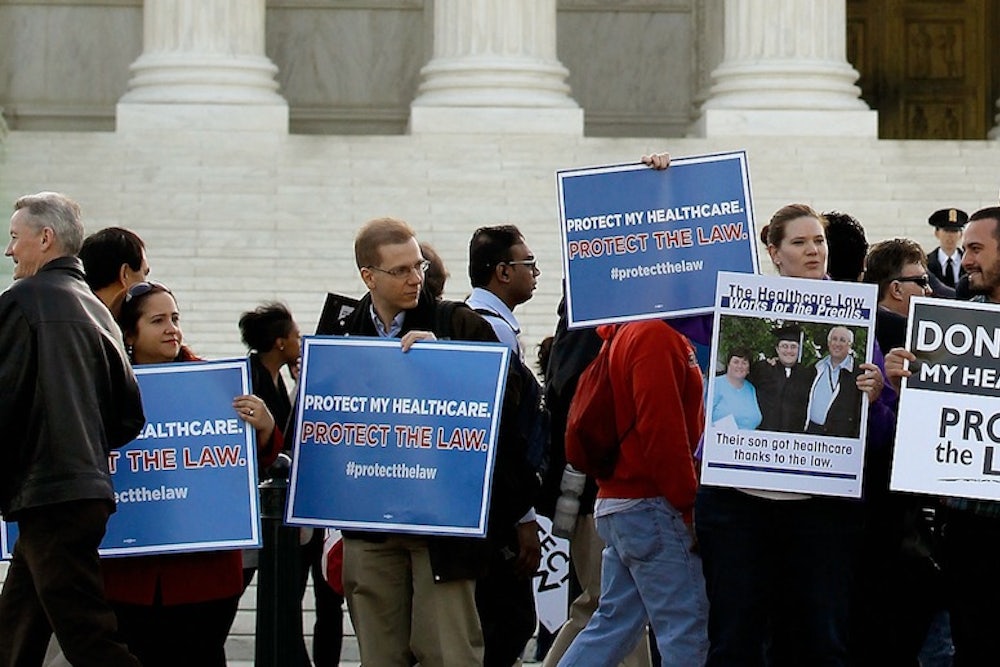If you thought we were done with legal challenges to Obamacare, think again.
Sometime soon, maybe even today, we’ll get some news about a new wave of lawsuits working its way through the federal court system. You may have heard of them. They are the brainchild of Michael Cannon, a health policy expert at the Cato Institute, and Jonathan Adler, a law professor at Case Western University. The lawsuits focus on Obamacare’s tax credits, which the federal government makes available to people who are buying insurance directly through the law’s new insurance marketplaces.
These tax credits are a really big deal. They are worth thousands of dollars a year in some cases. Take them away, and millions of people will lose their insurance while millions more will see their premiums skyrocket. But this is precisely what the lawsuits seek to do in 34 states—all because of some poor wording in the text of the statute, which Cannon and Adler say reflects congressional intent but most people who followed the debate, including me, say was a mere drafting error.
You can (and should) read the full version of the Cannon-Adler argument here. To simplify a bit, and to leave aside for now issues of legal doctrine, Cannon and Adler allege that Obamacare’s architects intended to use those tax credits as incentive: The federal government would make the money available only in states where officials agreed to run their own marketplaces, rather than handing that job over to the Department of Health and Human Services. To back up this claim, Cannon and Adler cite some carefully chosen quotes from the congressional record and language from early drafts of the bill.
With all due respect to Cannon and Adler, who are smart, I find their case utterly unconvincing. Not once in the 16 months I reported on the formal congressional debate did any of the law's architects suggest they were thinking along these lines. It wouldn’t make sense in the context of the law, which depends upon those subsidies to accomplish its primary goal. It's why assessments of Obamacare’s impact, including those from the Congressional Budget Office, assumed that residents of all states would have access to the tax credits.
That’s not just my opinion. It’s the opinion of experts like Nicholas Bagley, Samuel Bagenstos, and Timothy Jost. It’s also the opinion of former Capitol Hill staffers like Liz Fowler, who was the chief health care staffer on the Senate Finance Committee and knows as much about congressional intent as anybody. “Of course Congress did not intend to deny anyone in any state access to tax credits to which they are entitled,” Fowler told me in December, 2012, when I first wrote about these lawsuits. “That is not how the law is drafted and that is not how it was scored by the CBO.
So far, two federal judges at the district level have ruled on the case. Both rejected the lawsuits. But in the appeal of one of those cases, before a three-judge panel in the D.C. Circuit, the two Republican appointees sounded distressingly sympathetic. (Read Alec MacGillis’s contemporaneous account if you want details.) Nobody knows when they will issue a ruling, but it’s been a while since that hearing and the D.C. Circuit typically publishes opinions on Tuesdays and Fridays. Today could be the day.
However the ruling goes, it is unlikely to end the legal saga. If the federal government loses, it’s sure to appeal to the full D.C. Circuit, where a majority of Democratic appointees would be more likely to reject the lawsuit. Meanwhile, another Circuit panel heard the other appeal. Its judges appeared to be more hostile to the plaintiffs. Two other cases are working their way through different judicial avenues. Eventually one or all of the lawsuits could come before to the Supreme Court. It’s hard for me to imagine the case getting that far, let alone prevailing. But it’s not quite impossible—and that’s unsettling.
—Jonathan Cohn
Things to know
INFRASTRUCTURE: The White House backs legislation moving through the House that would cover the shortfall in the Highway Trust Fund using a budget gimmick known as pension smoothing. (Barney Jopson, Financial Times)
HEALTH CARE: The federal government is putting pressure on states to move their huge backlog of Medicaid eligibility applications, although some states think they're being unfairly targeted. (Jason Millman, Washington Post)
Things to read
IMMIGRATION: Daniel Gonzalez and Bob Ortega of the Arizona Republic have put together a detailed, unflinching, and unblinkered account of the journey several unaccompanied minors made from Central America to the U.S. border in Texas. It's one of best pieces on the subject we've seen.
It's expensive to be poor: Derek Thompson explains the additional difficulties of everyday lives for poor people who live off cash—the so called un-banked. (The Atlantic)
Abolish the CIA? At The Week, Ryan Cooper argues that the clandestine agency does almost nothing right.
Things to watch
Obama's focus is back on the infrastructure and the Highway Trust Fund. He is speaking on the highway bill from Virginia today.
Tonight, Hillary Clinton will be on The Daily Show for the first time since she was a presidential candidate in 2008.
Things at QED
Why the border crisis has nothing to do with border security. And you don't want to miss the huge on-air meltdown from CNBC's Rick Santelli yesterday, when he was confronted over his repeat failed forecasts.
